Portugal too reliant on Ronaldo, Spain must decide on Casillas or Valdes - what the big nations must address before World Cup
The qualification furore is all said and done and, as
eyes turn to the World Cup draw in December, Goal looks at what the top
sides must focus on between now and next summer
ANALYSISIt's all settled.
Barring a miracle performance from Jordan against Uruguay on Wednesday, we now know the 32 teams who will be taking part in the World Cup in the summer of 2014. It was, ultimately, Cristiano Ronaldo who took the plaudits on a dramatic final night of play-off action in Europe while the intercontinental matters were far more straightforward.
While rising stars in the shape of Belgium and Colombia will no doubt be among the fancied teams in Brazil, the traditional heavyweights will predictably have something to say.
When all is said and done, the giants will be expected to progress to the latter stages of the competition. With that in mind, we assess the problems and selection issues currently facing the biggest teams in the world.
| SPAIN - GOALKEEPING SITUATION DUE REVIEW |
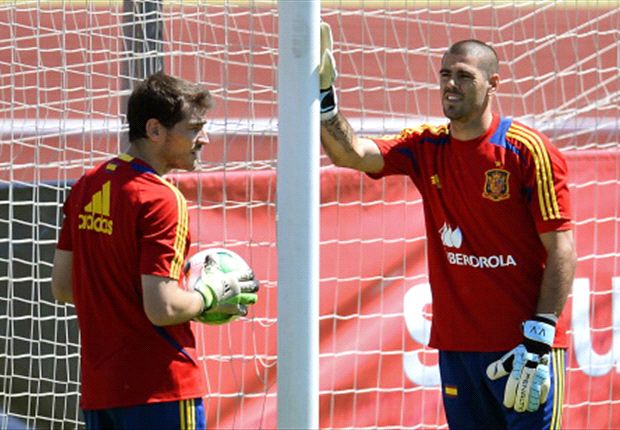
Captain Iker Casillas has been on the bench more often than not this season for Real Madrid and so there are concerns that the goalkeeper may not be 100 per cent match-ready by the time Brazil 2014 rolls around. Vicente del Bosque has offered no solid guarantees to San Iker about retaining his place and the increasingly foreboding shadow of Victor Valdes looms over his shoulder.
The Barcelona man is leaving Camp Nou at the end of the season and already enjoys a good line of communication with half of the first-choice back four. Where Valdes is impressive though, Gerard Pique has looked distracted and brittle. His form, and that of central defensive partner Sergio Ramos, is a worry.
The manner in which Madrid's defenders were decimated by Neymar in the Clasico and the attacking impulses of Jordi Alba show that Spain's defence is not likely to be watertight next summer.
There are also question marks in midfield where Xavi, at 33, is beginning to show signs of wear and tear. That he can be the beating heart of Barcelona all season long, and twice a week in Brazil's summer heat, is doubtful.
Having said that, the return to fitness of Xabi Alonso should help ease the burden, as will the emergence of Koke. Both players give Del Bosque the option of switching formation to 4-2-3-1.
Further up the field, Pedro continues to be quietly effective with 11 goals in his last 15 internationals and a winner against France tucked into his back pocket.
Any consternation over firepower, too, should be alleviated with the acquisition of Diego Costa - one of the most coveted forwards at club and, indeed, international level with Spain having beaten off Brazil for his allegiance. His power will go further than that of Fernando Torres up top.
Ben Hayward
| GERMANY - MIDFIELD INJURIES POSE SERIOUS QUESTIONS |
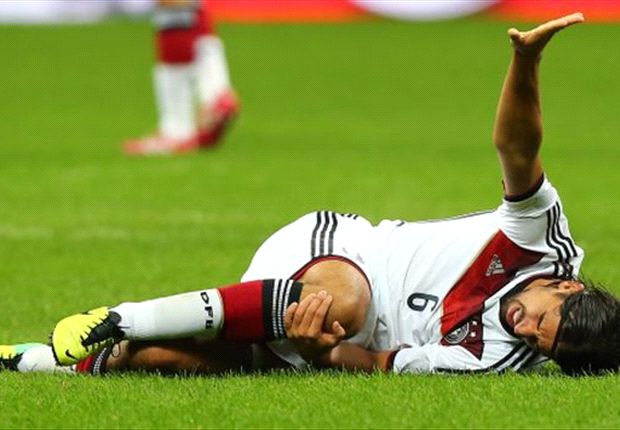
Germany continue to manufacture outstanding talents on their DFB assembly line but unless they have three high-class central midfielders in production then they could be in a spot of difficulty by the time the World Cup rolls around.
Sami Khedira is already rated doubtful for the tournament while Bastian Schweinsteiger has struggled for full fitness for almost two years. Combine that with the on-going back problems of Ilkay Gundogan and it is apparent that Joachim Loew could be hard-pressed for answers in that area.
Full-back Philipp Lahm could think himself a contender for that position given his Bayern Munich form but neither right-back nor left-back has a lot of depth either. Injuries for the captain or for Marcel Schmelzer would expose Germany to further problems.
Low has selection issues of his own at centre-back where Per Mertesacker and Jerome Boateng remain the first choices despite vociferous calls for the inclusion of Mats Hummels. If, and when, Holger Badstuber returns from injury things will become even more interesting.
The fact that Low can select second or even third-choice players without affecting the equilibrium of the side speaks volumes of the awesome strength in depth in most places. Max Kruse has recently made it a three-way fight for the starting shirt up front thanks to his performances for Borussia Monchengladbach. The form and injury of Italy-based duo Miroslav Klose and Mario Gomez means he could be the man most likely to seal the spot. Failing that, Mario Gotze could play as a withdrawn forward.
The rest of the squad looks well-settled and tournament ready.
Enis Koylu
| ARGENTINA - TOP-HEAVY SQUAD MAKES MESSI FORM VITAL |
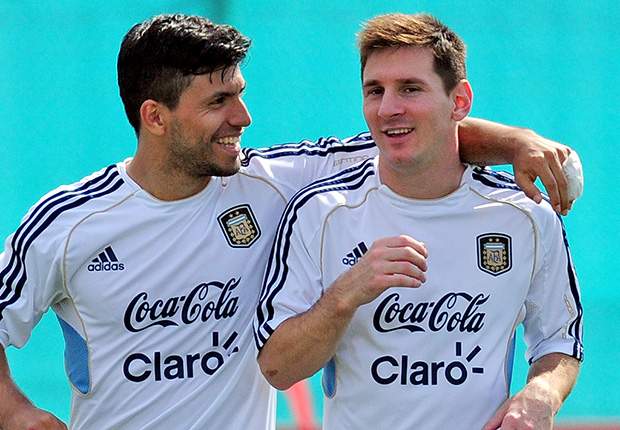
The recent injury to Lionel Messi on Barcelona duty shook the world but the long-term implications of that muscle tear should not affect the fortunes of Argentina at the World Cup. Crucially, since Alejandro Sabella's appointment, Argentina have finally found a way to get the best from him. In that respect, their one true tactical conundrum is solved.
Regardless of his form in Europe or that he showed during a loan spell with Velez, Fernando Gago was arguably Argentina's most important and impressive player over the latter stages of the qualification campaign. His ability to pass through the opposition from midfield has been vital to Messi's improved international form. Sabella will be keen for him, and not only Messi, to recover fitness and sharpness in time for World Cup 2014.
There are few forwards in the world you'd rather have playing alongside Messi than Sergio Aguero and Gonzalo Higuain and the form of both for their respective clubs so far this season has Argentina heading to the World Cup with what is probably the finest forward line in international football.
However, Sabella has repeatedly admitted his concerns with Argentina's defence. They are particularly vulnerable in the full-back positions, with the likes of Pablo Zabaleta often given little protection. Argentina have repeatedly experimented with a back three but with little success. Places are also still up for grabs for a number of the defenders on the periphery of the squad, with the likes of Nicolas Otamendi, Facundo Roncaglia and Lucas Orban hoping to earn a place in the final squad.
Also, Argentina have been without a top quality goalkeeper for a number of years but the rise of Sergio Romero proved more than enough to paper over that particular crack. However, with no sign of him getting any game time at new club Monaco, Sabella is becoming increasingly concerned that he could have a real problem between the posts.
Rupert Fryer
| NETHERLANDS - INEXPERIENCE BRINGS UNPREDICTABILITY |
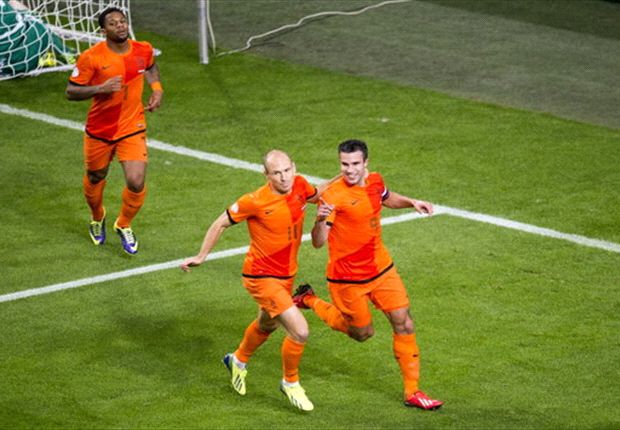
Traditionally a coach who prefers to work with younger players, Louis van Gaal has remained true to his his philosophy of renewal since taking up the reins with the Oranje.
It is, predominantly, an Eredivisie-based squad with players such as Daryl Janmaat, Stefan de Vrij and Luciano Narsingh not yet on the wider European radar.
Evidently, there is a lack of top-level talent in the squad that can only be partially offset by the presence of bonafide starts Arjen Robben and Robin van Persie. Both attackings at the peak of their respective careers, they exemplify the age-old Dutch problem of top-class attackers and merely competent defenders.
In games where the Netherlands are without the ball, they struggle to repel the opposition. That is no different in this particular group with no outstanding defensive leader to call upon either. Defensive jitters are probably not helped by the chopping and changing that takes place in the goalkeeping position either. Four have taken part in the qualification campaign: Premier League trio Michel Vorm, Tim Krul and Maarten Stekelenburg as well as Ajax's Jasper Cillessen.
The return from serious injury of Nigel de Jong, however, will add some much-needed experience to the spine of midfield. Van Gaal has already stated that simply emerging from the group stage is the aim for the World Cup with this young, eager team.
With some of the problems, and the egos, of campaigns past having subsided, there is every chance that this promising group can overachieve.
Stefan Coerts
| ITALY - PRANDELLI MUST SETTLE ON A FORMATION |
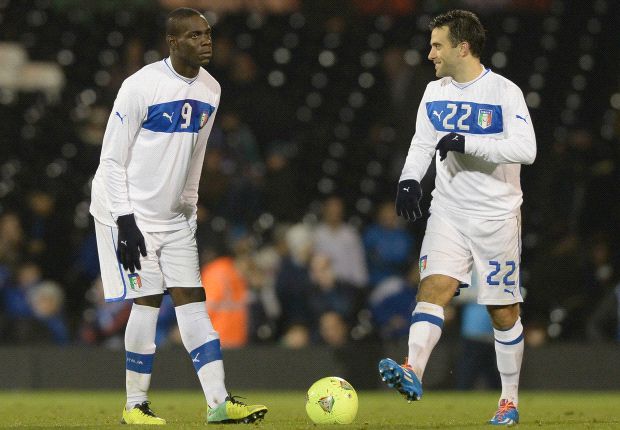
Cesare Prandelli qualified Italy with plenty of time to spare but he did so without settling upon a formation. During this calendar year, the Azzurri have played 18 times in eight different formations. The most popular among them, 4-2-3-1, was only utilised on four occasions. As a result of that capriciousness in the dug-out, Italy's once-fabled defence has slunk into a sorry decline.
Since the start of the Confederations Cup in June, the 2006 World Cup winners have conceded an unprecedented 21 goals in 12 games. The form of Gianluigi Buffon, this season, has not been good enough to be regarded as a reliable bail-out for the errors of the back three or four.
Elsewhere, the Italians are struggling to identify a quality trequartista, the discovery of which could prompt Prandelli to field a playmaker behind what looks a potent duo up front.
Giuseppe Rossi is in the form of his life after 18 draining months out injured and looks a useful outside bet for the Golden Shoe should he stay fit. Concerns remain over the aptitude and reliability of his mooted strike partner, though - one Mario Balotelli. But his ability is not in doubt and the pair could form an explosive partnership in Brazil.
There is a real togetherness in this group forged by Prandelli, and that counts for a lot in international football. Combine that with the class of Daniele De Rossi and Andrea Pirlo in midfield and it shows that Italy are still formidable.
Carlo Garganese
| ENGLAND - FAMILIAR FAILINGS |
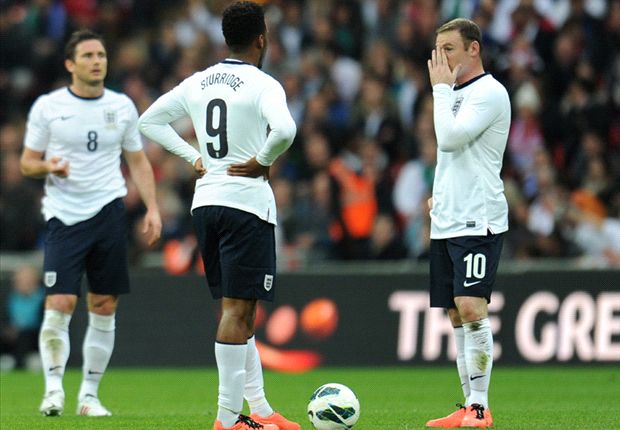
England managed to put away the so-called lesser nations with little difficulty in qualification but their record against fellow contending teams was quite ordinary. Some of the performances were nothing short of turgid when it mattered and the same old failings cropped up again.
Despite a glut of midfield options these days, Roy Hodgson's side continue to struggle with ball retention. Too often, the defenders are content to see the ball go long rather than favour build-up play through the middle. And, in Steven Gerrard, Frank Lampard, Jack Wilshere and Michael Carrick, the talent is certainly there even if the consistency is not. The formation though, 4-4-2, is predictable and, 13 years on, the Lampard-Gerrard conundrum remains unsolved.
It is telling that England were booed twice inside five days as they lost two friendlies, first to Chile and then to Germany. The fans have become frustrated with the idiosyncrasies in England's play and are embarrassed to have been shown up at Wembley in a couple of high-profile fixtures. Hodgson has made his choices, however. This is how England will play at the World Cup.
When a team is lacking a spark going forward, the very least they can expect is resoluteness in defence. England can't even count on that. There has been a worrying tendency to concede chances from counterattacks and crosses of late as uncertainties remain across the entire back four. Gary Cahill and Chris Smalling have been repeatedly caught out while Kyle Walker has not yet demonstrated that he is of the required standard. One area England have been strong in for a decade or more is left-back but even Ashley Cole is now on the wane. He could yet lose his starting berth to Leighton Baines.
The goalkeeping situation is complicated too with Joe Hart, arguably, in the the most exacting circumstances of his career. He must pick up.
It's not all doom and gloom though. England proved that if they can get the ball to Andros Townsend, things can happen. Add to that the potential in Wayne Rooney and Daniel Sturridge's partnership and you have a side capable of causing bother - if the supply comes.
The recent friendly defeats were shots across the bows for England expectations. The general consensus is for a quarter-finals exit. As that would require them to beat a team in the last 16, don't count on it.
Sam Lee
| BRAZIL - SETTLED SQUAD BUT PLENTY OF PRESSURE |
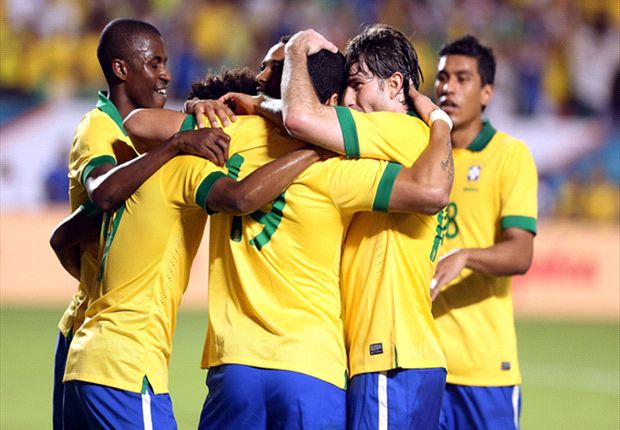
Simply put, Luiz Felipe Scolari currently has no real selection headaches in his Brazil squad. He has his group more or less decided, with as many as 20 players already having secured their place on the plane home next summer. The few remaining spots are now down to the fringe men to earn.
Scolari's main focus upon his appointment was to instil an unbreakable bond amongst his squad, evoking comparisons to the 'Scolari family' that lifted the 2002 World Cup. Those who have earned places in the squad have done so as much through their off-field conduct as their performances on the pitch. That sense of community and camaraderie is plain to see, with a number of players claiming they've never been part of a squad that enjoys each other's company so much.
That said, a few kinks still need to be ironed out. While Luiz Gustavo's defensive qualities and Paulinho's charging up and down the pitch alongside him have helped inspire Brazil to just one defeat in their last 17 matches, they have at times struggled with finding a penetrating pass out from the back.
The aforementioned midfield duo have a myriad virtues but neither quite possesses the intelligence on the ball to get Brazil moving when pressed by the opposition. Scolari has experimented with introducing Hernanes but that has left the midfield too open for his liking.
Scolari said this week that "Brazil feel no pressure. Brazil will be world champions." But the pressure on the team as the World Cup returns to Brazil for the first time since the Maracanazo will be unlike anything they've ever felt before. Two hundred million expect nothing but victory.
Rupert Fryer
| PORTUGAL - RELIANCE ON RONALDO COULD BURDEN BENTO |
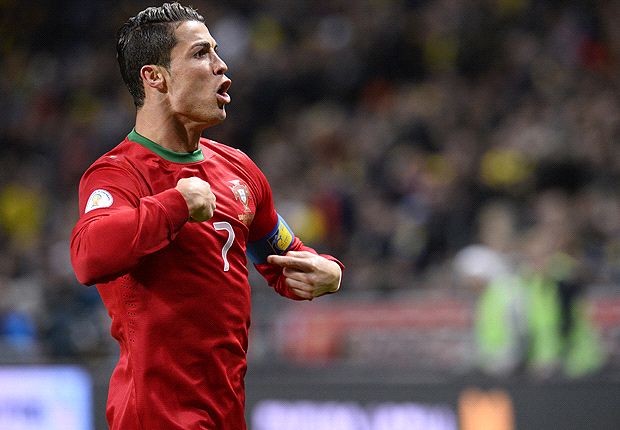
Paulo Bento claimed before the second-leg defeat of Sweden that there is more to his Portugal side than their star No.7, but the two games themselves went a long way to proving otherwise. When all is said and done, the Seleccao have little by the way of big-game match-winning ability outside of Cristiano Ronaldo.
The key question is the best place to play the Real Madrid man for the sake of the team. The skipper is undoubtedly a fan of playing off the left, as he does with regularity for Real Madrid, but Portugal don't have some of the striking options the Blancos have had over the past few years. Helder Postiga and Hugo Almeida have been left to fight over the chance to lead the line with little by way of quality competition waiting in the wings. There is going to come a time in the World Cup when Ronaldo needs help in taking the game to major opponents and Portugal don't have the standard of striker necessary to deliver often enough on such occasions.
If Bento believes that his reserves on the flanks are deeper than those front and centre, then he may benefit from bending Ronaldo's ear over a switch to a more central role. Naturally, Portugal's main hopes rest on Ronaldo, but he has that quality to deliver with regularity. Just as he has been the key man in many a Real Madrid victory since 2009, he has been more or less producing the goods for his national side ever since he first pulled on the red and green shirt.
In the midfield trio of Raul Meireles, Miguel Veloso and Joao Moutinho, the Portuguese have a stable base from which to work. Between the three of them they have the ability and tenacity to find and use enough possession to give Portugal options out wide while providing Ronaldo with enough of the ball to do his thing.
They may not have conceded an obscene number of goals in qualifying - nine in 10 games in total - but the fact the shipped three in Israel, two in Northern Ireland and even one in Luxembourg proved that Portugal's back line isn't particularly difficult to break down. While Pepe and Bruno Alves have made names for themselves over a period of time, neither has looked altogether convincing on the road to Brazil, and any sustained period of pressure on their defence could easily end their tournament come next June.
Kris Voakes
| FRANCE - SMELLS LIKE TEAM SPIRIT |
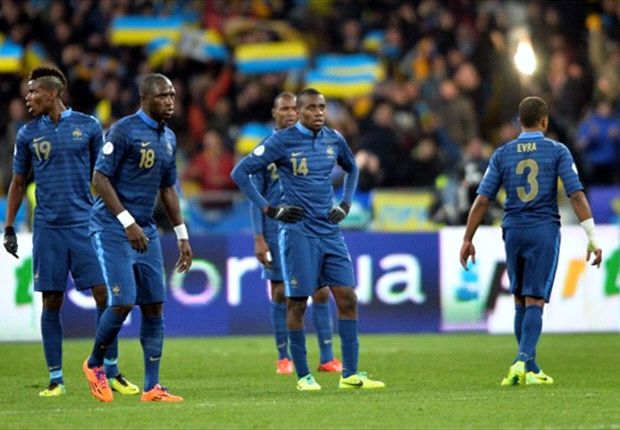
Although France were outstanding in their togetherness and camaraderie during Tuesday's victory over Ukraine, they need to show there is a passion to play with such desire on a regular basis. Too often, old-fashioned team spirit has been a missing ingredient for les Bleus and Deschamps must look to use Tuesday's win as a staging post. France were seemingly in an impossible position to qualify after losing 2-0 in Kiev, yet they bounced back superbly and summoned the spirit of '98 in Paris.
Some of their results in qualification defied belief such is the quality of player in their ranks. Franck Ribery, perhaps, best typified that contradiction. He was a frustrating figure for fans of les Bleus, who saw the winger produce world-class performances for Bayern Munich only to turn in mundane displays for his country. Over the course of the 2013, however, he has become a real leader for Deschamps' side.
Selection problems exist elsewhere. In the first leg against Ukraine, the central-defensive combination of Eric Abidal and Laurent Koscielny failed. Four days later it was the raw duo of Mamadou Sakho and Raphael Varane who carried France to the World Cup, though they came under limited pressure. Deschamps must quickly establish his first choices.
Since accusing Bixente Lizarazu of being a parasite, Patrice Evra has seen his popularity diminish even further. Arguably he is the weakest link presently in the France back four, yet as a senior player without particularly great competition he will be hard for Deschamps to overlook. The press will pounce on any weakness here.
And the big question up front. Can Karim Benzema lead the line? For so long the Real Madrid striker has been France's great hope in attack, yet he has often flattered to deceive with his country. Olivier Giroud has been more promising for les Bleus, though hardly outstanding.




No comments:
Post a Comment